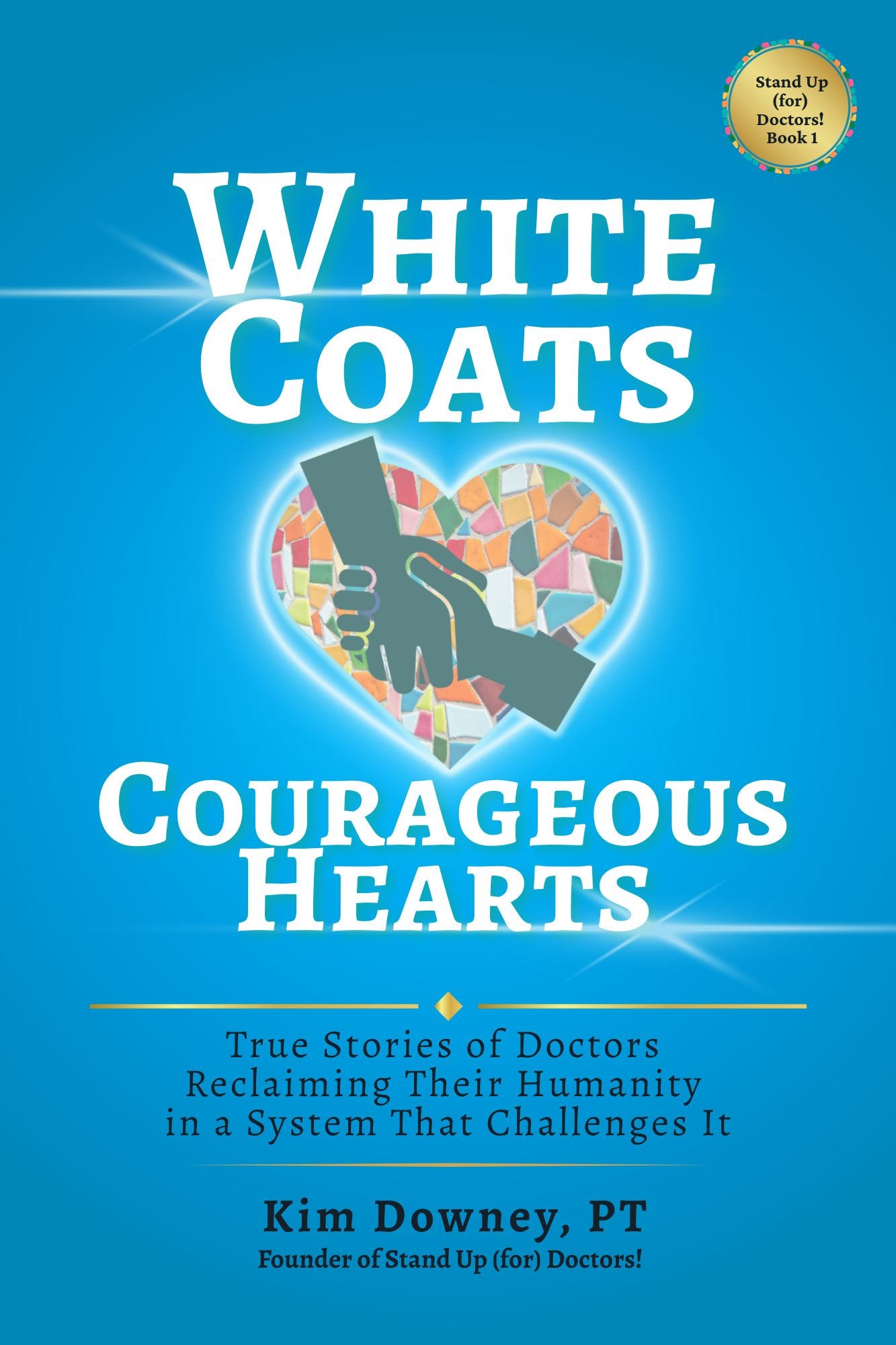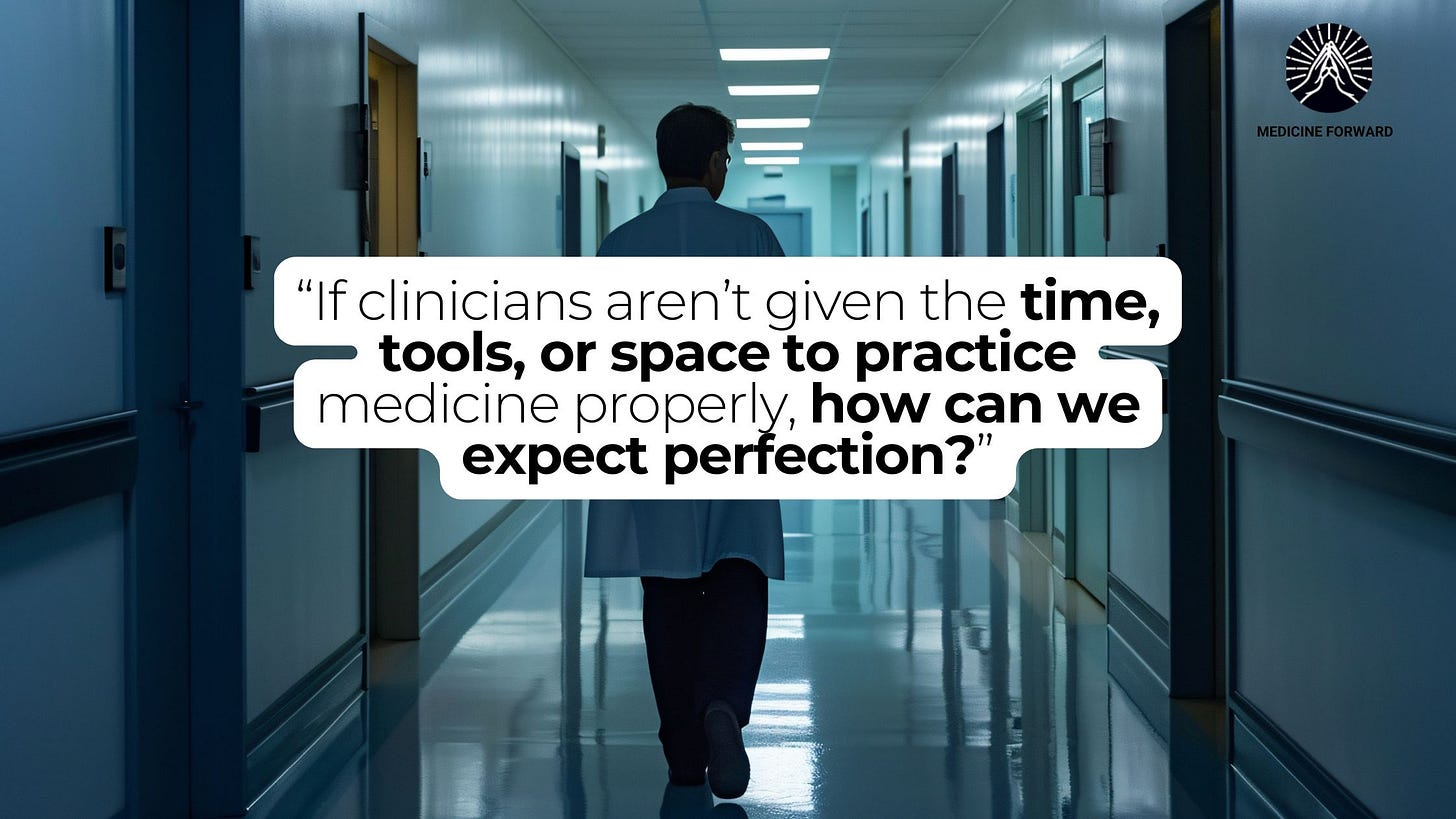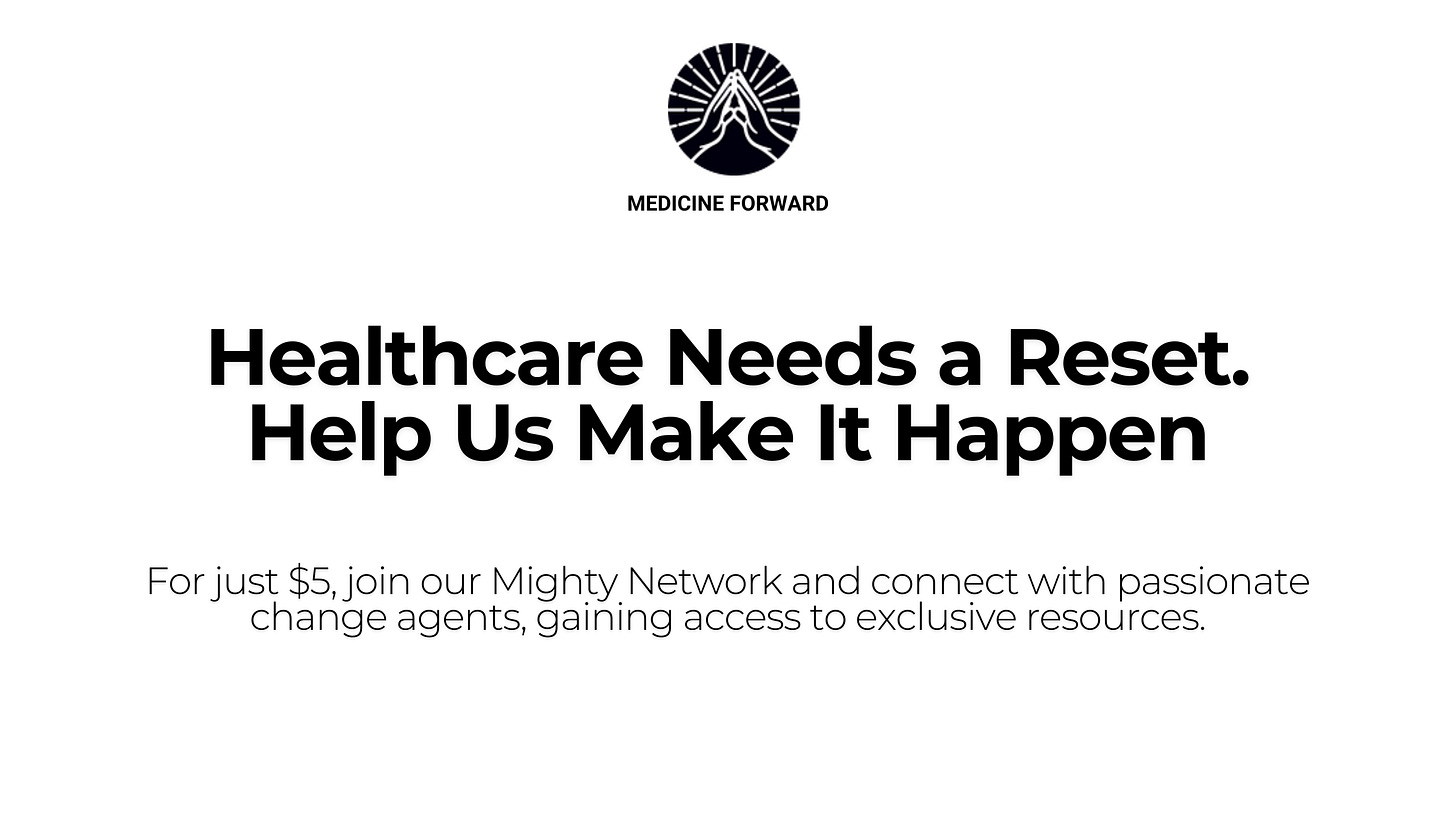Healing From Within: Stories of Courage, Agency, and Change in Medicine
This month, we share personal reflections on system failures—and how presence, purpose, and resilience can help rebuild trust in healthcare.
June 2025
Dear Medicine Forward Community,
We’re proud to announce the upcoming release of White Coats, Courageous Hearts—a bold, beautiful new book curated by our very own Kim Downey, PT, Community Ambassador for Medicine Forward.
White Coats, Courageous Hearts is a powerful collection of 15 raw, true stories from doctors navigating the deeply human challenges of modern medicine. This compelling anthology illuminates the emotional journeys of physicians striving to stay whole in a system that often demands extraordinary self-sacrifice.
We’re especially thrilled that Todd Otten, MD, our Lead Catalyst at Medicine Forward, is a contributing author. His voice adds to this compelling call for change in the culture of healthcare.
Whether you're a medical professional seeking solidarity or someone hoping to understand the emotional cost of practicing medicine today, these stories offer insight, hope, and connection.
Launching on Amazon on June 9.
What’s In Your 15%?
Early on in the development of the field of quality improvement, W. Edwards Deming and others identified that 85% of the challenges faced by workers are due to systemic issues that are beyond the ability of those individuals to resolve. This was an important concept since, up until that time, when something went “wrong,” management typically pointed at the person/people involved and blamed them for the outcome. According to this principle, the significant majority of the bad outcomes were due to the work processes- the series of steps taken to achieve consistent outcomes. This process focus is critical and reveals underlying root causes (like poor materials, lack of training/communication, etc.) that impact the individuals on the front lines.
The research on burnout has suggested that the causes of burnout and the interventions that might help have a similar 85%/15% breakdown. 85% of what contributes to/causes burnout are system factors created/decided upon by organizational leaders, regulators, insurers, etc. It is crucial that work focusing on processes such as EMR design and workflow, prior authorization, and productivity requirements is prioritized.
Liberating Structures are a suite of methods for organizing time and space for group interactions that change the pattern of how we look at challenges and how we interact, leading typically to amazing experiences and outcomes. One of them that I like very much is called 15% Solutions. It takes the Deming 85% / 15% framework and, as one of my mentors often said, “flips it on its head.” Instead of focusing on the 85% that you personally cannot change, you begin to focus on the 15% where you can take action(s), small as it may seem. You ask yourself a question such as “Thinking of ____ (challenge), what is in your 15%? Where do you have discretion and freedom to act? What can you do without more resources or authority?”
Thinking about what is in one’s 15% can be truly liberating. Rather than feeling powerless and fearful/frustrated, it helps people begin to take action. As actions get started, things change and stuff gets learned. What happens with those changes and learnings often lead to other things, and momentum may begin to develop. Eventually, a tipping point might be reached, just as dropping grains of sand on a sandpile will eventually trigger a landslide.
As Tagore said, “You cannot cross the sea by standing and staring at the water.” When it seems like you are powerless to act against huge systemic forces, realize that your 15% is always available to you! Taking action is a way that is within your control and can be energizing, motivating, and liberating. And these small actions may lead to surprisingly big outcomes.
In Focus: Error, Responsibility, and the Fight for Professional Fulfillment
By Paul Westfield
At Medicine Forward, we recognize that human-centered care must include not only patients—but also the professionals who serve them. In this reflective piece, leadership coach and former military officer Paul Westfield draws on his experience in aviation and high-performance environments to explore what happens when the system fails those tasked with making it work.
It’s comforting to believe that most physicians—like fighter pilots—are humble, easy to influence, and team-oriented. Are you finished laughing yet?
In truth, strong egos and deep confidence are often necessary in high-stakes situations. We saw this in the military: when leaders lost the "warrior spirit" and drifted into bureaucracy, culture declined, motivation dropped, and trust eroded. Eventually, pilots left—but they had somewhere to go: the airlines.
But where does a physician go when the original vision of medicine—of service, purpose, and success—is dismantled? Many press on silently, disillusioned and exhausted. The profession becomes a bait-and-switch.
I’m new to this group, and I don’t pretend to know medicine or the technical nuances of various specialties. But I do know what happens to high-performing people when they’re trapped—unable to be the version of themselves they once imagined. This is why freedom must be central to any conversation about the future of medicine.
Physicians deserve the freedom to:
Spend time with patients without rushing.
Prescribe what’s medically needed without interference.
Work without second-guessing from administrators.
Have a life outside of practice.
And above all—to be the doctor they set out to become.
From Aviation to Advocacy
Around 2014, I began hearing stories: cardiothoracic surgeons and emergency physicians cursing at teams, throwing instruments—operating rooms filled with fear, not focus. As a former officer and aviation safety evaluator, this was unthinkable.
In my world, leadership mattered too much to allow this behavior. I knew I could help. I had been working with pilots on emotional intelligence and mindfulness. So, I became certified as a physician development coach and began coaching in healthcare.
Then I encountered the numbers. Johns Hopkins research estimates 795,000 diagnostic errors with adverse effects annually—and up to 300,000 deaths. While the details are debated, the scale is undeniable. These aren’t numbers—they’re people.
And no physician or nurse shows up planning to make a mistake.
Often, deeper analysis reveals that what looks like individual error is actually a systemic failure. But when no analysis is done, the clinician is left with guilt, shame, and self-doubt—a form of moral injury that has nothing to do with their intentions or skill.
Responsibility and the System
Together with my partner, I now conduct human factors analysis to help healthcare professionals understand what really went wrong—and reclaim their confidence. We often find that rushed environments, poor documentation systems, and time constraints force clinicians into “shortcut” thinking (heuristics), leading to missteps that leadership should be accountable for.
If clinicians aren’t given the time, tools, or space to practice medicine properly, how can we expect perfection?
And yet—we all want to feel that our work matters. That sense of fulfillment is what keeps people going. But if you’re working 80 hours a week without joy or autonomy, what’s left?
You deserve a life beyond EMRs and burnout. (And yes—volunteering really does release dopamine, serotonin, oxytocin, and endorphins. Science confirms it.)
Why I Believe in Medicine Forward
Fighting for what matters is the only answer—but no one should have to fight alone.
Organizations like Medicine Forward matter because they amplify collective voices. We don’t all need to organize unions to create change—there are many ways to build power. Public education, strategic advocacy, and mobilizing patients can put pressure where it counts.
What if the public knew that doctors could reduce errors—but aren’t allowed to?
What if lawmakers realized they could save lives by passing legislation that empowers physicians rather than hospital administrators?
Aviation figured this out. Why not medicine?
The time for systemic change is now. You deserve the freedom to be the doctor you imagined—and the system deserves your voice.
Paul Westfield is a former USAF A-10 fighter pilot and airline captain who now applies decades of aviation safety expertise to reducing medical error. As a certified Physician Development Coach and co-founder of Medical Safety Action Systems, he brings deep insight into leadership, human factors, and the emotional realities of high-performance teams in healthcare.
Carrying It Forward: A Reflection from Dr.Todd Otten
Dr. Todd Otten, Medicine Forward’s Lead Catalyst and former Naval flight surgeon, offers this personal reflection on what the 15% means in real-life leadership and why it still matters:
“As a former Naval flight surgeon for VP-10, my role was to keep the squadron healthy. My individual role certainly represented 15% (or less), and yet the medical department had an incredible impact on the other >85% of the squadron. We were considered integral by the Commanding Officer.
It’s a reminder that regardless of our sphere of influence, whatever that percentage is, we are a small part of the sum of the whole. That is exactly what Medicine Forward is about: a small organization catalyzing massive positive change.
Join us, and play your part to heal our broken healthcare system.”
The System Won’t Fix Itself. But Together, We Can.
At Medicine Forward, we’re not just telling stories—we’re building a movement to reclaim what healthcare was meant to be: human, compassionate, and guided by trust.
Every month, we shine a light on the people speaking out, the systems breaking down, and the courage it takes to demand better. From exposing the real cost of moral injury to amplifying clinicians and patients who refuse to stay silent, this work is more than content—it’s action.
But here’s the truth: we can’t do it without you.
A $5 monthly membership helps sustain this growing network of physicians, patients, and advocates who are done accepting the status quo. Your support enables us to keep publishing, organizing, and challenging a system that’s lost its way.
If you’ve ever read something here and thought, This is exactly what I’ve been feeling, now is the time to act. Help us keep going—and growing.
🔗 Become a Member
Because change in healthcare doesn’t just happen. It’s made—by people like you.
Thank you,
Gabe Charbonneau, MD, Co-founder, Medicine Forward
Todd Otten, MD, Lead Catalyst / Board Chair, Ripple of Change
Jeff Cohn, MD, Mental Fitness & Leadership Coaching Officer, Care to Change Coaching Christopher Behringer, DO, DipABLM, MBA, Chief Program Officer
Kim Downey, Community Ambassador, Stand Up for Doctors
MaryAnn Wilber, MD, MPH, MHS, Public Health Strategist, The Doctor Is No Longer In Emee Vida Estacio, PhD, CPsychol, SFHEA, Psychologist and Author, “Fear Is Not My Enemy”
Nimra Savanghan, Digital Content and Collaboration








Seeing our collaborative book here put the biggest smile on my face, thank you all :)!
Fantastic messages in this issue!!